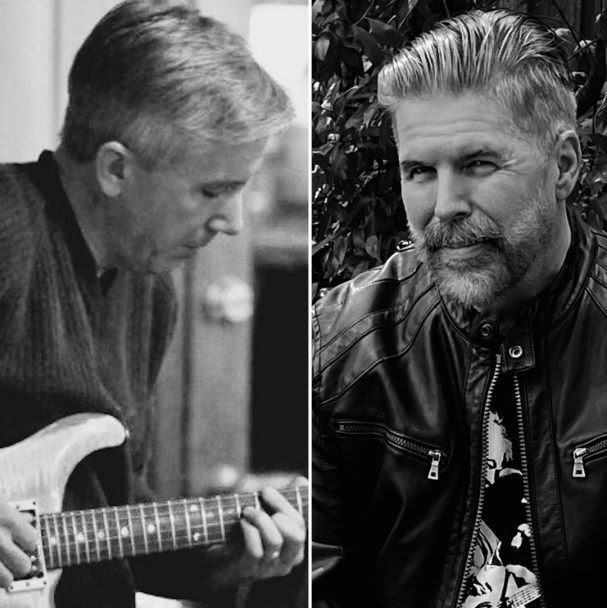In the haunted valleys of country rock and the shadowy bends of Americana noir, Glass Cabin stands as a duo forged in the fires of experience, emotion, and edge. Based in Nashville, Tennessee, the band is a sonic collaboration between two seasoned musicians, Jess Brown and Dave Flint, whose individual legacies breathe life into a sound that’s both evocative and unapologetically raw. Together, they form not just a band, but a storytelling engine built on grit, memory, and mood. Jess Brown, the voice at the heart of Glass Cabin, carries with him a staggering legacy as a songwriter whose pen has sculpted country music’s emotional canon for decades.
Hailing from West Virginia and New York, Brown has been the lyrical force behind hits like Julie Roberts’ Break Down Here which the New York Times lauded as an instant country classic, as well as standout singles for Lee Ann Womack, Tracy Lawrence, Trisha Yearwood, and Randall King. His songwriting has graced over 25 million records, earning spots on platinum albums, Top 100 Road Songs, and Grammy and CMA-nominated projects. Yet, beneath the accolades lies a songwriter rooted in human vulnerability, a trait that defines every Glass Cabin track. Dave Flint, the band’s sonic architect, brings a depth of instrumental storytelling shaped by decades on the road and in the studio.
A native of upstate New York, Flint was a founding member and lead guitarist of Billy Montana and the Longshots, a journey that led to a major label deal with Warner Bros under legendary VP Martha Sharp. After relocating to Nashville, he toured with several actsmost notably Highway 101, and established himself as a go-to session musician and producer. With Glass Cabin, Flint marries his rich musical instincts with Brown’s lyrical weight, creating a landscape of sound that’s as soulful as it is sonically cinematic. Together, Glass Cabin crafts what critics have described as hard-edged heartland Americana at its finest. Their music is a fusion of ’70s rock textures, edgy Americana, and a left-of-center gothic spirit, the kind of music that sounds like it belongs in the back pages of a Daniel Woodrell novel. It’s not just a genre; it’s a feeling. A place. A mood.
With the slow-burn intimacy of a confessional whispered into the dark, Glass Cabin returns with I Don’t Know, their hauntingly beautiful new single released on March 21, 2025. Serving as the latest preview from their upcoming third album, this track distills everything that defines the duo’s distinctive artistry, Brown’s gritty, soul-worn vocals and Flint’s masterfully textured instrumentation, into four-and-a-half minutes of emotional gravity. From the first weary chord to the last aching fade-out, I Don’t Know doesn’t seek to entertain, it seeks to understand. It unfolds like a shadow creeping across the desert, a soundtrack for anyone suspended in that fragile space between loss and clarity. Anchored in the heartland but steeped in dusk-lit mystery, the song is a striking testament to Glass Cabin’s ability to blend vintage Americana with a gothic edge, creating something timeless, dreamlike, and deeply human.
From the very first mournful strum, Glass Cabin’s I Don’t Know unveils itself not merely as a song, but as a deeply intimate confession steeped in vulnerability and existential reckoning. It opens slowly, like the unfolding of an old letter found in a forgotten drawer, written in ink that still bleeds. The ambient drone that hums beneath the opening chords is not ornamental, it acts as a low, emotional current that foreshadows what’s to come. It draws you in with the kind of gravity that makes you stop whatever you’re doing, compelling you to listen closely, as if something fragile and sacred is about to be shared. The Nashville-based duo creates a sonic space that feels like dusk suspended in time, fading light, long shadows, and a sky heavy with memory. There’s no urgency in the pacing, and yet, every second drips with tension, as though the music is holding its breath between thoughts too heavy to say out loud.

Musically, the track is a masterclass in emotional minimalism. Dave Flint’s guitar tone is not simply textured, it’s weathered, like it’s been soaked in years of cigarette smoke, cheap whiskey, and honest regret. His guitar strings sings with a distortion that is never overwhelming, but always aching, an echo that sounds like it’s bleeding out from the walls of a dusty motel room at the edge of nowhere. The composition leans into an Americana sensibility, but one that’s soaked in noir, a darker, more introspective palette than the bright, steel-stringed country of old. The drum beat serves as a progressive core, creating a steady beat that blends perfectly with the guitar melodies to create something truly magnificent. The transitions throughout the song are seamless and organic; there are no grand choruses or explosive bridges. Instead, the piece gently mutates, like a river carving deeper through rock. Subtle shifts in rhythm and mood serve as emotional pivots, pulling you further into its spell. The arrangement refuses to adhere to pop formulas, it breathes, pauses, and exhales like a living, weary soul.
Jess Brown’s vocal delivery is the quiet storm at the center of it all. His vocals are not pristine or polished; rather, they’re real, frayed at the edges, warm, and absolutely gut-wrenching. He sings each line as if it’s all that’s holding him together, his tone somewhere between a whisper and a drawl, evoking the ghosts of Tom Petty and Eric Burdon. There’s a beautiful weariness in his phrasing, as if every syllable carries the weight of unsaid things and roads not taken. His vulnerability is not performative, it’s lived-in. Lines like I don’t know, don’t feel like lyrical placeholders; they become desperate truths, repeated not to be understood, but to be felt. This isn’t a performance that asks for applause, it begs for understanding. His voice doesn’t rise in power; it descends in depth, sinking lower into your gut with every passing verse, until you find yourself submerged in his sorrow.
But what makes I Don’t Know truly magnetic is the synergy between Brown’s haunting vocal and Flint’s intuitive instrumentation. There’s a spiritual tether between them that transcends arrangement, it’s emotional telepathy. The guitar doesn’t just accompany the voice; it responds to it, breathing in the silences and exhaling just enough pain to mirror the lyricism. It’s a conversational performance, not a layered one, and in that conversation, a third presence is born: the atmosphere. Together, they create a haunting tapestry of grief, acceptance, and uncertainty. The spaces between words are filled with guitar swells and ambient textures, and the way the notes and vocals wrap around each other feels almost like a prayer, raw, uncertain, but full of longing. It’s in this subtle interplay that the song gains its depth; neither element dominates, and yet both are irreplaceable. You don’t just hear the song, you feel the tension between them as if it’s your own. As a listener, the emotional impact hits hard and early.

From the opening moments, I felt my chest tighten, not from sadness, per se, but from recognition. I Don’t Know doesn’t push you to feel; it allows you to. It evokes the stillness of staring out a window after a long goodbye, the kind of emotional pause where clarity and chaos meet. The vibe is ghostly, aching, and remarkably present. It’s a sonic paradox, it feels like being alone in a room full of memories. The production, in its stripped-down elegance, does not seek to impress with complexity, but stuns with its honesty. There’s an ambient spaciousness that lets every breath of the vocal and every tremble of the guitar resonate fully, untouched by studio gloss. It’s high-fidelity heartbreak, captured with such care that even the silence has weight. The overall atmosphere of the song is one of suspended emotional gravity. There are no dramatic flourishes or cinematic crescendos. Instead, Glass Cabin allows the listener to float in this weightless melancholy, to feel the heaviness without direction.
It’s not simply about sadness, it’s about the spaces between decision and doubt, the emotional terrain where nothing is certain and yet everything matters. The beauty of I Don’t Know is that it never pretends to offer closure. It leaves you with questions rather than answers, with feelings instead of conclusions. And in doing so, it mirrors life in its most honest, unscripted moments. Glass Cabin’s I Don’t Know is a stunning portrait of emotional ambiguity painted in shadows and soul. It’s a song that doesn’t try to be more than it is, and in that humility, it becomes something more, a mirror for those navigating the murky waters of loss, reflection, and the unknown. With its intoxicating blend of voice and instrumentation, its impeccable emotional pacing, and its exquisite production, it lingers long after the final note. Not as a memory, but as a feeling, haunting, honest, and heartbreakingly human.
For more information about Glass Cabin, click on the icons below.



